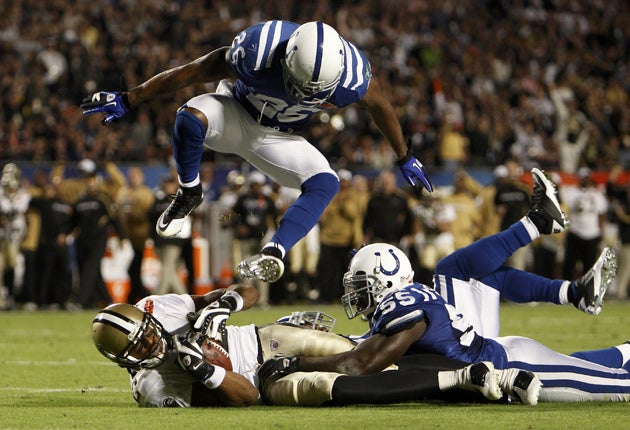Super Bowl Live, BBC1<br/>Life on Mars USA, FX
The Super Bowl holds a fascination for British viewers, even if most of us haven't a clue what's going on

Staying up to watch the Super Bowl from the UK is like eating Hershey chocolate from the US: there's a trace of what makes the stuff good, but the memory only makes you pine for the real thing.
I'm no hardline sports fan, but the Super Bowl is more than sport: it's a pop-cultural event. (And there are plenty like me: this year's game surpassed the finale of M*A*S*H to become the most-watched American TV show of all time.) Hence I have an informal agreement with a few equally under-athletic friends to find a widescreen set on which to see it each year, even if it means a miserable time at work the next morning.
Our imitation of Stateside sports fandom remains a sorry one. The La-Z-Boys are more likely Ikea sofas. The hot-dog rolls lack the greasy sheen of an American bun. The nachos aren't big enough; the melted cheese isn't processed enough; the beer isn't weak enough. While the BBC couldn't entirely conceal the in-game advertising – for the "Doritos Half-Time Analysis" or the "Intel Post-Game Show" – Limey audiences are denied the blockbuster commercials that give Americans something to talk about in the interminable pauses between plays.
So while the ads rolled on CBS, the BBC was saddled with stale banter from what was obviously the Match of the Day studio, decorated with a single American football helmet in hope of disguising it. Sitting on the pundits' couch in place of Alan Hansen was Alex Smith, quarterback for the San Francisco 49ers and a man who manifestly ought not to be in shirtsleeves, gamely re-explaining the rules of his sport to host Jake Humphrey.
Teams are not "teams" in the US; they're "franchises". The Indianapolis Colts, favourites to win Sunday's Super Bowl XLIV, are originally from Baltimore, but were bought and shuffled westward by some billionaire owner or other. Which would have been one good reason to support their opposition, if we hadn't already possessed a handful more: like the fact that the Saints are from New Orleans, and have triumphed over the adversity of Katrina; or that they'd never been to the Super Bowl before, and were thus the underdogs.
My friends and I spent the first hour or so of the game – which lasted four hours – trying to remember the rules without letting on that we'd all forgotten them since last year. "So, how many quarters are there?" somebody whispered. The Who played at half time, and we were at least qualified to play air guitar in time with "Baba O'Riley". But by the end we'd given up on understanding much of what was happening on the field, and resorted to yelling quotes from Jerry Maguire and Any Given Sunday.
American football is strategic and mechanical, made up not of fluid play but of pre-ordained moves that are rarely disrupted by circumstance. Complex thought is required only of the coach and his quarterback; everyone else is meticulously positioned meat. Americans seem less obsessed by the plays than by the statistics to which each tiny detail of the game contributes, which is why the screen forever flashes with captions like "First onside kick inside third quarter during Super Bowl" and the post-match analysis might note that "Brees [the Saints quarterback] was 32 of 39 overall for 288 yards, with two touchdowns, zero interceptions and a 114.5 QB rating".
By the time the game ended at 3am GMT, there had been approximately 10 seconds of bona fide footballing excitement for the uninitiated viewer, when Saints cornerback Tracy Porter intercepted a pass, disappeared through a gap in the defence and sprinted 74 yards to score the game's final, winning touchdown. As for the ads, which I sought out the following day on YouTube, one of them was for an evangelical anti-abortion organisation, and another was an in-joke involving US talk-show hosts Jay Leno and David Letterman. Just like the rest of the night's action, they'd leave most British viewers baffled.
Speaking of transatlantic mis-translations, I always thought Life on Mars a tad overrated, but the series (which ended in the UK in 2007) had the conviction to maintain its ambiguity to the end. We never learnt conclusively why Sam Tyler woke up in 1973 having his balls busted by Gene Hunt. Whoever rewrote the finale for its US incarnation, screened last week on FX, had no such faith in mystery. Tyler awoke in a spaceship, in 2035, on his way to the red planet; I kid you not. The software designed to keep his brain active while in stasis had malfunctioned, leaving his thoughts stranded in the Seventies. His mission was a "gene hunt" to find – you guessed it – life on Mars.
Subscribe to Independent Premium to bookmark this article
Want to bookmark your favourite articles and stories to read or reference later? Start your Independent Premium subscription today.

Join our commenting forum
Join thought-provoking conversations, follow other Independent readers and see their replies